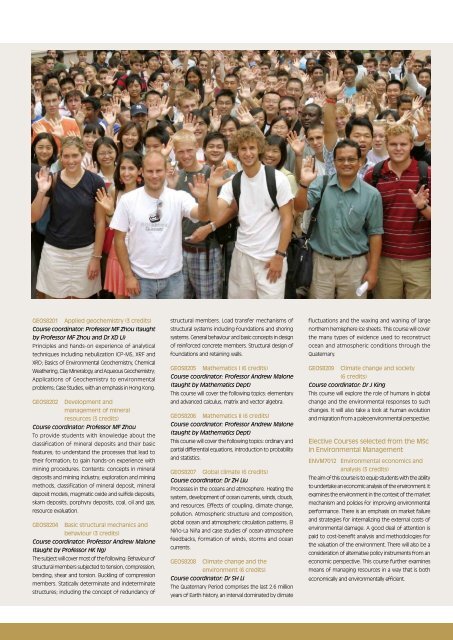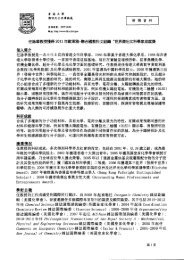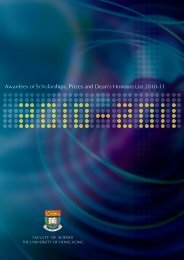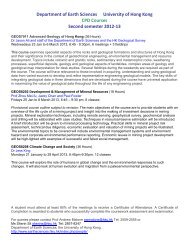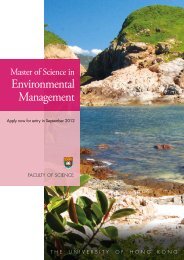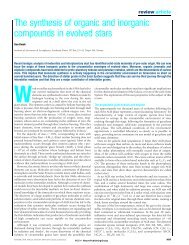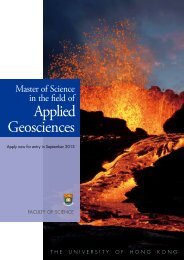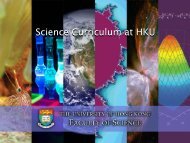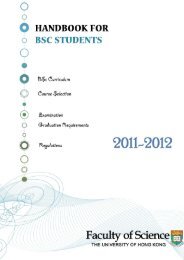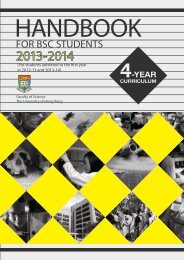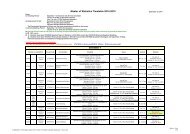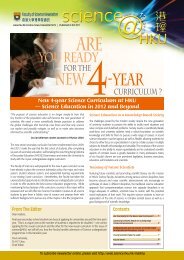Applied Geosciences - Faculty of Science, HKU - The University of ...
Applied Geosciences - Faculty of Science, HKU - The University of ...
Applied Geosciences - Faculty of Science, HKU - The University of ...
You also want an ePaper? Increase the reach of your titles
YUMPU automatically turns print PDFs into web optimized ePapers that Google loves.
GEOS8201 <strong>Applied</strong> geochemistry (3 credits)Course coordinator: Pr<strong>of</strong>essor MF Zhou (taughtby Pr<strong>of</strong>essor MF Zhou and Dr XD Li)Principles and hands-on experience <strong>of</strong> analyticaltechniques including nebulization ICP-MS, XRF andXRD; Basics <strong>of</strong> Environmental Geochemistry, ChemicalWeathering, Clay Mineralogy, and Aqueous Geochemistry;Applications <strong>of</strong> Geochemistry to environmentalproblems; Case Studies, with an emphasis in Hong Kong.GEOS8202 Development andmanagement <strong>of</strong> mineralresources (3 credits)Course coordinator: Pr<strong>of</strong>essor MF ZhouTo provide students with knowledge about theclassification <strong>of</strong> mineral deposits and their basicfeatures; to understand the processes that lead totheir formation; to gain hands-on experience withmining procedures. Contents: concepts in mineraldeposits and mining industry; exploration and miningmethods, classification <strong>of</strong> mineral deposit, mineraldeposit models, magmatic oxide and sulfide deposits,skarn deposits, porphyry deposits, coal, oil and gas,resource evaluation.GEOS8204 Basic structural mechanics andbehaviour (3 credits)Course coordinator: Pr<strong>of</strong>essor Andrew Malone(taught by Pr<strong>of</strong>essor HK Ng)<strong>The</strong> subject will cover most <strong>of</strong> the following: Behaviour <strong>of</strong>structural members subjected to tension, compression,bending, shear and torsion. Buckling <strong>of</strong> compressionmembers. Statically determinate and indeterminatestructures; including the concept <strong>of</strong> redundancy <strong>of</strong>structural members. Load transfer mechanisms <strong>of</strong>structural systems including foundations and shoringsystems. General behaviour and basic concepts in design<strong>of</strong> reinforced concrete members. Structural design <strong>of</strong>foundations and retaining walls.GEOS8205 Mathematics I (6 credits)Course coordinator: Pr<strong>of</strong>essor Andrew Malone(taught by Mathematics Dept)This course will cover the following topics: elementaryand advanced calculus, matrix and vector algebra.GEOS8206 Mathematics II (6 credits)Course coordinator: Pr<strong>of</strong>essor Andrew Malone(taught by Mathematics Dept)This course will cover the following topics: ordinary andpartial differential equations, introduction to probabilityand statistics.GEOS8207 Global climate (6 credits)Course coordinator: Dr ZH LiuProcesses in the oceans and atmosphere. Heating thesystem, development <strong>of</strong> ocean currents, winds, clouds,and resources. Effects <strong>of</strong> coupling, climate change,pollution. Atmospheric structure and composition,global ocean and atmospheric circulation patterns, ElNiño-La Niña and case studies <strong>of</strong> ocean-atmospherefeedbacks, formation <strong>of</strong> winds, storms and oceancurrents.GEOS8208 Climate change and theenvironment (6 credits)Course coordinator: Dr SH Li<strong>The</strong> Quaternary Period comprises the last 2.6 millionyears <strong>of</strong> Earth history, an interval dominated by climatefluctuations and the waxing and waning <strong>of</strong> largenorthern hemisphere ice sheets. This course will coverthe many types <strong>of</strong> evidence used to reconstructocean and atmospheric conditions through theQuaternary.GEOS8209 Climate change and society(6 credits)Course coordinator: Dr J KingThis course will explore the role <strong>of</strong> humans in globalchange and the environmental responses to suchchanges. It will also take a look at human evolutionand migration from a paleoenvironmental perspective.Elective Courses selected from the MScin Environmental ManagementENVM7012 Environmental economics andanalysis (3 credits)<strong>The</strong> aim <strong>of</strong> this course is to equip students with the abilityto undertake an economic analysis <strong>of</strong> the environment. Itexamines the environment in the context <strong>of</strong> the marketmechanism and policies for improving environmentalperformance. <strong>The</strong>re is an emphasis on market failureand strategies for internalizing the external costs <strong>of</strong>environmental damage. A good deal <strong>of</strong> attention ispaid to cost-benefit analysis and methodologies forthe valuation <strong>of</strong> the environment. <strong>The</strong>re will also be aconsideration <strong>of</strong> alternative policy instruments from aneconomic perspective. This course further examinesmeans <strong>of</strong> managing resources in a way that is botheconomically and environmentally efficient.


